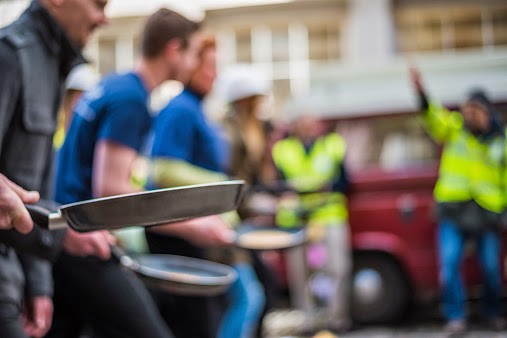Reposted for your Mardi Gras enjoyment.
Weeks of food antics peak on the last day of pre-Lent, Shrove Tuesday (a.k.a. Mardi Gras, Fat Tuesday, Fasten's Eve, or Fastnacht). The name "Shrove" derives from the customary pre-Lenten "shrift" (confession), but it's mostly known for gluttony.
By now we're supposed to have had our last deluxe bacon-cheeseburger for the duration. In the old days, eggs, butter, fat, milk, and cheese were also considered verboten during Lent, so Shrove Tuesday was devoted to emptying the larder. For old times' sake, you might consider following this tradition, which also happens to be a healthier way of eating...
Flipping out over pancakes is so universal on Shrove Tuesday that the holiday is sometimes called "Pancake Tuesday" ... In England, Pancake Day is celebrated with races at which women over the age of sixteen, frying pans in hand, trot over 415 yards while tossing pancakes over at least three times...
In New Orleans, one of the less over-the-top Mardi Gras customs involves baking King's Cake, a yeasty, buttery confection flavored with lemon zest, cinnamon, and nutmeg decorated with purple, yellow, and green icing -- and these aren't even it's most distinguishing characteristics.
A tiny doll of the baby Jesus is baked inside the cake, which, when done, is doled out in huge slices. Whoever gets the slice with the doll provides the King's Cake the following year ... For an authentic King's Cake recipe check out the one at www.theholidayspot.com/mardigras.
Shrove Tuesday (Pancake Day) precedes Ash Wednesday and the period of Lenten fasting. Pancakes were eaten to use up proscribed foods, and it is claimed that their ingredients have special Lenten symbolism: flour is the staff of life; milk is innocence and purity; salt is incorruptibility; and eggs symbolize creation.
Here's my favorite recipe for
pancakes. Enjoy!

1 comment:
Just now getting to this post.... no eggs, butter, milk or cheese.... but what would I eat? Those seem like such staples to me....
Post a Comment